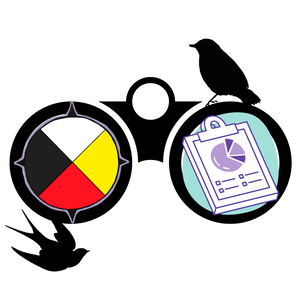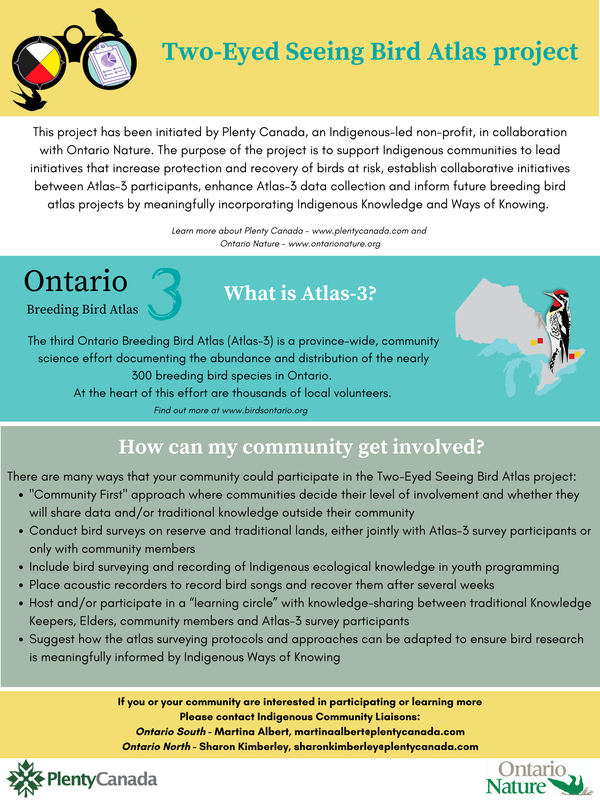 Plenty Canada is excited to have launched our new ‘Two-Eyed Seeing Bird Atlas’ project, in partnership with Ontario Nature. There is currently a province-wide breeding bird survey underway for the third Ontario Breeding Bird Atlas (Atlas-3). The Atlas is a collaborative, volunteer-driven five-year effort (2021-2015) to map Ontario’s approximately 300 species of breeding birds. The Atlas is repeated every 20 years to see how bird distributions and populations change over time. You can learn more at birdsontario.org. The Two-Eyed Seeing Bird Atlas project has a "Community First" approach, supporting Indigenous community initiatives that increase the protection and recovery of birds at risk and culturally significant birds. The project aims to establish collaborative initiatives between Indigenous communities and Atlas-3 participants, help enable Indigenous communities and individuals to participate in Atlas-3, enhance Atlas-3 data collection, and support a learning process to explore how breeding bird surveying protocols and approaches can be adapted to be informed by Indigenous Ways of Knowing. How can Indigenous communities get involved? Plenty Canada is committed to conducting this project within the framework of Ethical Space and Two-Eyed Seeing. Communities will determine their interest and level of involvement, including whether they will share data and/or traditional knowledge outside their community. There are many ways that a community can participate in the Two-Eyed Seeing Bird Atlas project: Surveying: ● Conduct bird surveys on reserve and traditional lands, either jointly with Atlas-3 survey participants or only with community members ● Use knowledge of birds and their songs to survey birds and to gather evidence of bird breeding (all skill levels can be accommodated, training and equipment can be provided!) ●Include bird surveying and recording of Indigenous ecological knowledge in youth programming- providing opportunities to excite youth about birding and conservation, and grow their ecological and traditional knowledge ● Place acoustic recorders to record bird songs and collect them after several weeks ● Participate in efforts to identify the songs of the species recorded by the acoustic recorders Knowledge-Sharing: ●Host and/or participate in a “learning circle” with knowledge-sharing between traditional Knowledge Keepers, Elders, community members and Atlas-3 participants ● All learning circles will begin and end in ceremony ● Plenty Canada staff will assist in the recording of knowledge, e.g. bird names in Indigenous languages, observed behaviours or changes in particular species, methods of harvesting, preparation and storing significant bird species (recorded and/or shared only with permission) ● Suggest how the atlas surveying protocols and approaches can be adapted to ensure bird research is meaningfully informed by Indigenous Ways of Knowing ● Through discussions via structured learning circles or informal meetings, find out more about the significant birds in the community from Atlas-3 participants (including expert bird researchers) ● Gain more knowledge about the health of harvested birds for consumption ● Utilize previous Atlas data to help inform a nation’s conservation efforts, land use planning, etc. Plenty Canada will facilitate where needed and when asked, providing connections to the Atlas-3 participants, access to training and equipment, and funding for learning circles, travel and other expenses. Interested individuals or communities can contact the Indigenous Community Liaisons: Ontario South - Martina Albert, [email protected] Ontario North - Sharon Kimberley, [email protected] – Emily Morris, Martina Albert, Sharon Kimberley This project was undertaken with the financial support of: Ce projet a été réalisé avec l'appui financier de:
0 Comments
Your comment will be posted after it is approved.
Leave a Reply. |
|
-
Home
- Donate
-
Projects
-
Canada
>
- Plenty Canada CampUs
- The Healing Places
- Two-Eyed Seeing Bird Knowledge
- Niagara Escarpment Biosphere Network
- Greenbelt Indigenous Botanical Survey
- Great Niagara Escarpment Indigenous Cultural Map
- Ginawaydaganuc Indigenous Food Sovereignty
- Indigenous Languages and Cultures Programs >
- Wild Rice
- Good Mind Grappling (partnership)
- Ginawaydaganuc Village (partnership)
- Youth Programming >
- Americas >
- Africa >
-
Canada
>
- News
- Resources
- Partners
- Contact Us
Our Location266 Plenty Lane Lanark, Ontario Canada K0G 1K0 (613) 278-2215 |
Donate to
|
Subscribe to our Newsletter |


